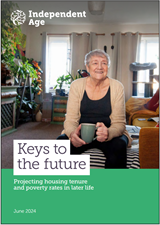Keys to the future: Projecting housing tenure and poverty rates in later life

This research, conducted by the UK Collaborative Centre for Housing Evidence for Independent Age (CaCHE), predicts a bleak future, with increasing poverty among older renters as the UK's ageing population grows. It found the number of renters in later life will rise substantially, with almost one quarter of all people aged 65 and over predicted to be living in rented accommodation by 2040.
This will mean the proportion living in the private rented sector more than trebles from 4% in 2022 to 13% in 2040. And, whilst the majority of people in later life will still own their own homes, there will be a decline in the proportion of people aged 65+ living in homes they own or in social homes.
The research also found that older private renters are at severe risk of financial insecurity and pay the highest proportion of their income on housing costs compared with people in other housing tenures. It also points out that, with the current housing system failing to deliver the affordable, secure homes that people need, more older people are finding themselves living with financial insecurity. For example:
- poverty among older people will increase from 17% to 23%. This would mean that the number of people living in poverty in later life across the UK could increase from 2.1 million in 2022 to 3.9 million people by 2040;
- poverty will increase more for older women than older men, going from 20% of older women currently in poverty to a forecast 26%. Reasons for this could include women having less capacity to save due to challenges like the Gender Pay Gap or time out of work due to caring responsibilities;
- poverty levels among older people with a disability will increase significantly from 18% to 29% which compares to a projected increase in poverty in the non-disabled older population from 17% to 19%. Those with disabilities often face additional costs to manage their conditions, resulting in fewer opportunities to save.
